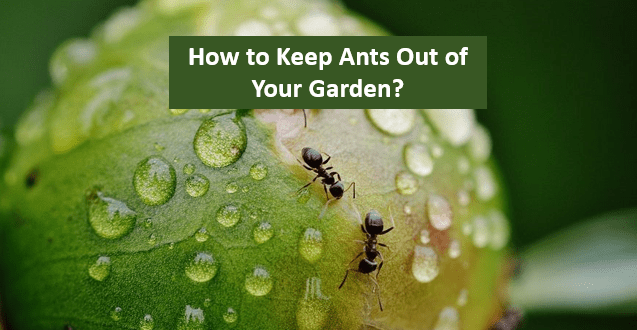How to Keep Ants Out of Your Garden?
Ants can be both fascinating and problematic creatures in your garden. While they play important roles in soil aeration and breaking down organic matter, they can also disrupt your garden’s harmony by farming aphids and damaging your plants. In this guide, we’ll explore effective methods to keep ants out of your garden while maintaining a healthy and thriving outdoor space.

Use Natural Repellents
- Cinnamon and Cayenne Pepper: Ants have a strong aversion to certain spices. Sprinkle ground cinnamon or cayenne pepper around the base of your plants. This creates a barrier that ants are reluctant to cross.
- Ant Repellent Scents: Consider using ant-repellent scents like cayenne powder or black pepper. These spices not only add flavor to your dishes but can also deter ants from invading your garden.
- Food-Grade Diatomaceous Earth: This natural, abrasive substance can be sprinkled around your garden. Diatomaceous earth’s microscopic particles will scratch the ants’ bodies, causing them to dehydrate and die.
- Lemon Juice or Vinegar Spray: Create a 50/50 mixture of lemon juice or vinegar and water. Spray this solution on your plants and around the garden perimeter. The acidic scent repels ants without harming your plants.
Create Physical Barriers
- Fabric or Paper Wraps: For individual plants at risk, wrap the base with a strip of fabric or paper. Ensure it’s high enough to prevent ants from climbing up to the leaves.
- Gravel Borders: Surround your garden bed with a layer of gravel. Ants find it challenging to traverse through gravel, effectively creating a barrier to keep them out.
Prevent Ants from Farming Aphids
- Food-Grade Diatomaceous Earth (Again): This remarkable substance also prevents ants from reaching aphids on your plants. Dust the affected areas with diatomaceous earth to disrupt the ants’ farming activities.
Homemade Remedies
- Baking Soda and Powdered Sugar: Create a homemade ant bait by mixing equal parts baking soda and powdered sugar. Place this mixture near ant trails. The sugar attracts them, and the baking soda disrupts their digestive system. This method effectively eliminates the ants.
Remember that the specific method you choose may depend on the type of ants infesting your garden and your garden’s unique characteristics. By employing these natural, eco-friendly strategies, you can protect your garden from ant invasions while maintaining a healthy and thriving outdoor space. Always wear appropriate safety gear when handling and applying any substances in your garden.
FAQ’s
How do I get rid of ants in my garden permanently?
There is no guaranteed way to get rid of ants in your garden permanently. However, by following the tips above, you can help to keep ants under control. If you have a severe ant problem, you may need to call a professional pest control company.
What are the dangers of ants in my garden?
Ants can damage your plants by eating the leaves, flowers, or roots. They can also carry diseases that can harm your plants or pets. In some cases, ants can even be a nuisance or a health hazard to humans.
How do I prevent ants from coming back to my garden?
The best way to prevent ants from coming back to your garden is to keep your garden clean and tidy. This means removing any food sources, sealing up cracks and crevices, and using ant-repelling plants. You can also make an ant trap to catch any ants that do enter your garden.
How long does it take to get rid of ants in my garden?
The time it takes to get rid of ants in your garden will vary depending on the severity of the problem. If you have a small ant problem, you may be able to get rid of it in a few weeks. However, if you have a severe ant problem, it may take several months to get rid of it completely.
What are the best ways to prevent ants from coming back to my garden?
The best way to prevent ants from coming back to your garden is to keep your garden clean and tidy. This means removing any food sources, sealing up cracks and crevices, and using ant-repelling plants. You can also make an ant trap to catch any ants that enter your garden.
